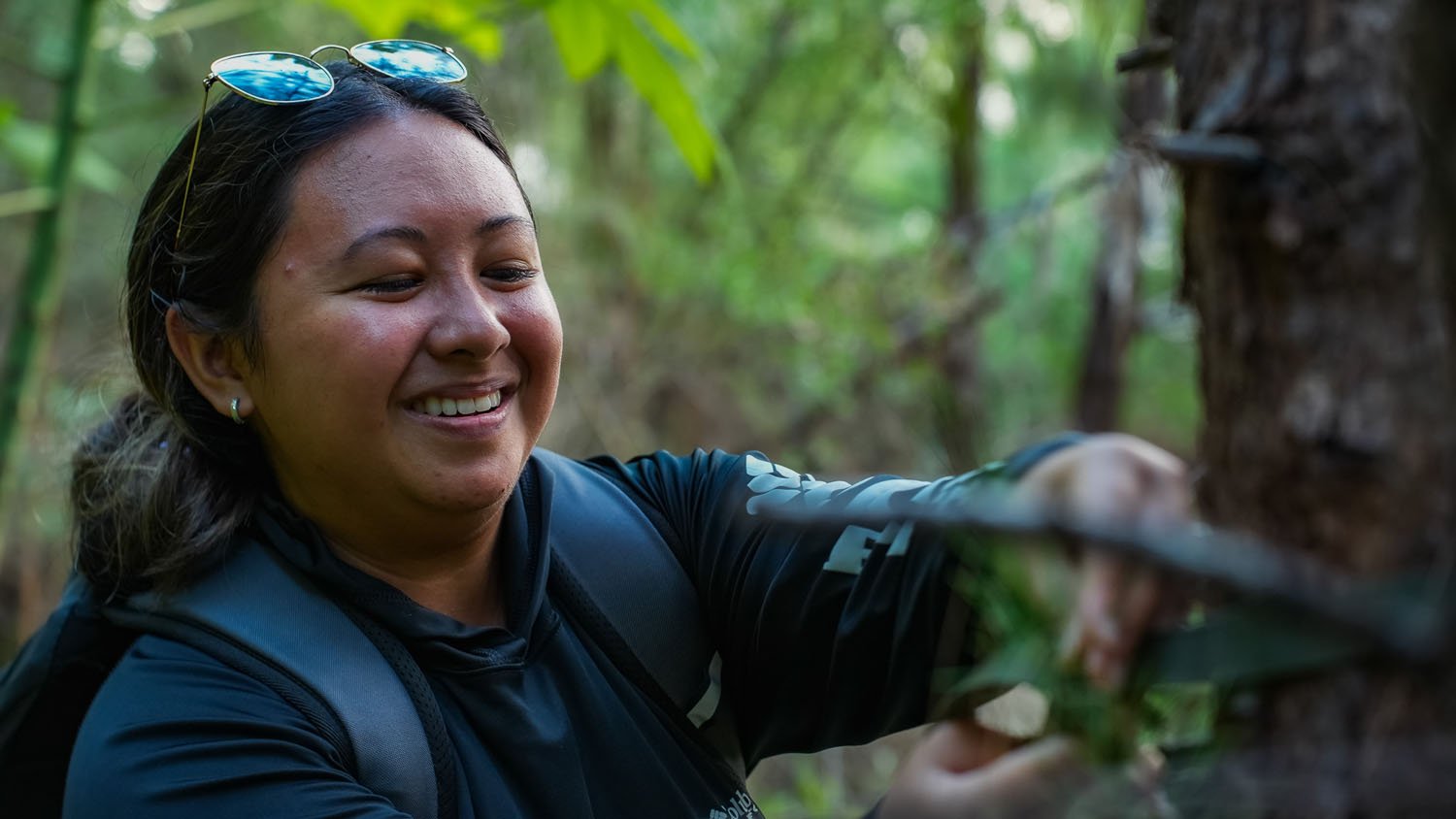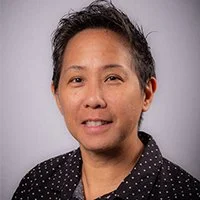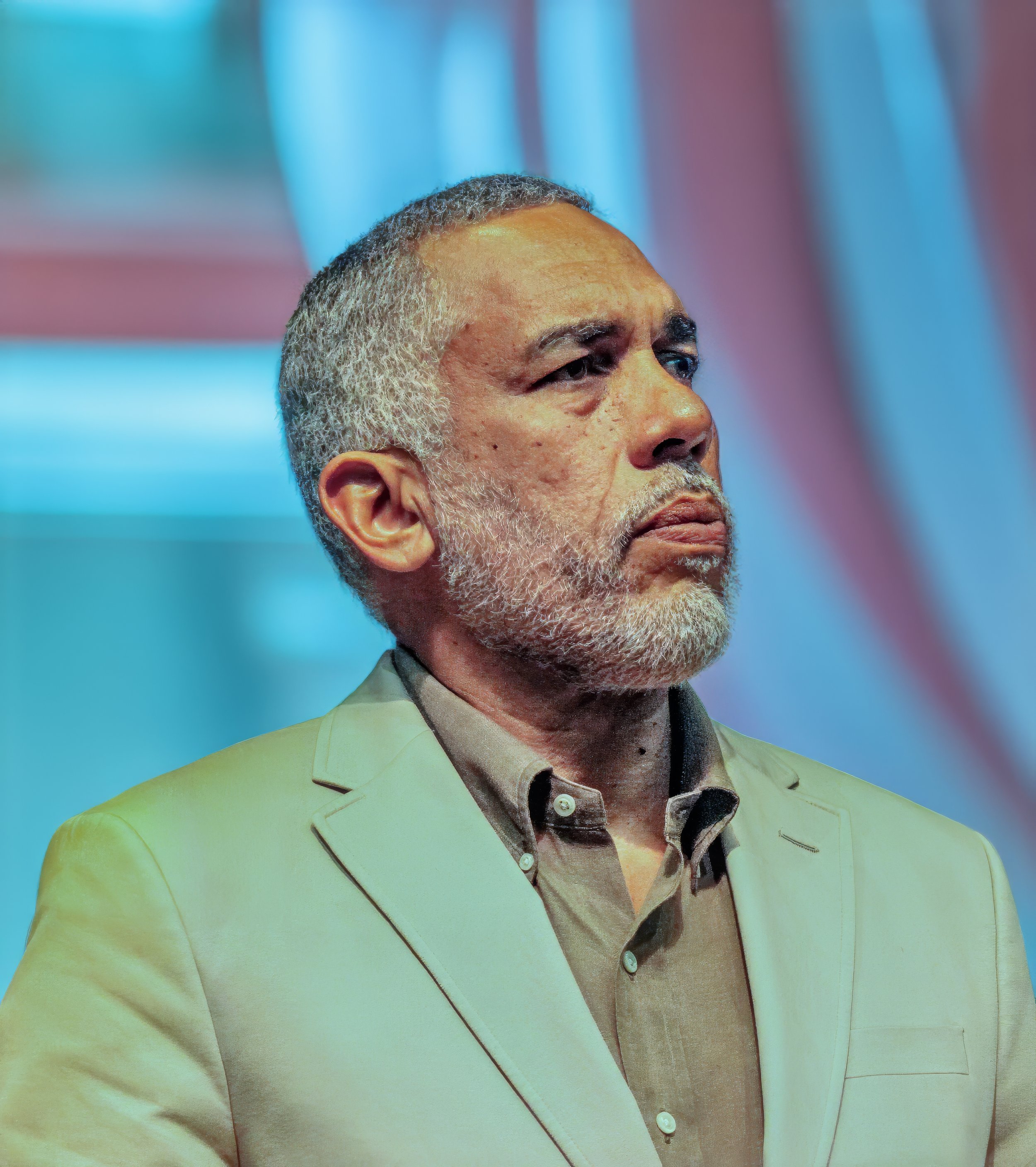
“In my Fellowship I’m
able to do so many
different kinds of
projects. It’s so
exciting!”
Chloé Camacho, USVI Hub

The Navigating Home Project
Navigating Home is a U.S. National Science Foundation project that engages the United States territories of the U.S. Virgin Islands, Puerto Rico and Guam and supports recent on- and off-island graduates in the geosciences and who originally hail from one the three U.S. territories.
The goal of Navigating Home is to place recent graduates into new short- (2.5 month) and long-term (1-2 years) marine and environmental science job opportunities to build local workforce capacity. Training provided will be tailored to ensure graduates have the skills required to contribute to an island-based, marine and environmental science workforce.
The U.S. Virgin Islands hub includes two lead organizations including the University of the Virgin Islands and the Virgin Islands Department of Planning & Natural Resources.
Their vision is to cultivate and nurture new leaders and champions in marine and environmental science from pre-college to the workforce, grounded in local interests, community needs and reciprocity.
The Puerto Rico hub includes two lead organizations, the Universidad Interamericana de Puerto Rico’s Recinto Metro campus and the Puerto Rico Department of Natural and Environmental Resources.
Their vision is to build and support an accessible geoscience pathway for broad participation of students in Puerto Rico to develop the next generation of leaders and practitioners.
The Guam Hub is aligned with the University of Guam and Guam Green Growth.
Their vision is to support island scientists leading connected STEM enterprises at home and across the globe.

“Navigating Home is an exciting project that supports islanders and builds STEM workforce capacity in our island territories”
– Dr. Kristin Wilson Grimes, Project Lead from UVI’s Center for Marine and Environmental Studies
Project Vision and Mission Statement
Navigating Home will contribute to building marine and environmental science research communities that reflect the communities of our islands.
Our goals are to bring back, train, and retain islanders who have Bachelor’s or Master’s degrees in the marine and environmental sciences, and who want to be part of their home island’s workforce; strengthen partnerships between island-based universities and their local partners; provide transdisciplinary training related to public engagement through science and community engagement; and transform geoscience culture through these strategies and partnerships.

We leverage the NSF INCLUDES SEAS Islands Alliance to foster workforce opportunities in the islands by collaborating with universities and local partner organizations. The project strengthens connections and opportunities by supporting fellows, strengthening the local workforce and creating shared systems of leadership.


OUR LEADERSHIP TEAM
PI, U.S. Virgin Islands
I am a Research Associate Professor in the Center for Marine & Environmental Studies at the University of the Virgin Islands (UVI). My research examines human impacts to nearshore environments, especially mangroves.
At UVI, I teach in the Masters of Marine & Environmental Science program, mentor students, and engage the community through outreach and education, running the Mangroves in the Classroom project and the territory-wide Great Mangrove Cleanups.
I lead the NSF Includes SEAS Islands Alliance, a $10M National Science Foundation-funded network that supports students from middle school through to the workforce in the marine and environmental sciences from the USVI, Puerto Rico, and Guam. I am also the Director for the Virgin Islands Water Resources Research Institute, a network of 54 institutes across the US in partnership with the U.S. Geological Survey.
Allison Black-Maier is a Research Associate at Catalyst Consulting Group, which serves as the backbone team that supports the Navigating Home project behind the scenes. She was trained as a cognitive psychologist and received her Ph.D. from Duke in 2017. Allison's doctoral research focused on learning and memory, studying the processes that promote long-term retention as well as those that make us prone to memory errors. Since graduating, she has applied her research skills as an evaluator of both formal and informal education programs. Allison particularly enjoys helping partners use relational databases that allow them to track the outcomes they care most about. For example, Allison helped develop and manage the Salesforce database that the SEAS Islands Alliance used to document student pathways in STEM.
Co-PI, U.S. Virgin Islands
I am the Co-PI for the USVI Hub for Navigating Home and has mentored several Workforce Fellows. Born and raised in St. Thomas, I am passionate about protecting the U.S. Virgins. Currently, I am the Director of the newly created Division of Territorial Parks & Protected Areas within the Virgin Islands Department of Planning and Natural Resources (VI DPNR). During my time working in the VI DPNR, I have led environmental outreach initiatives, provided project management, and connected the environmental community through networking and event facilitation. My programs, such as Science Saturday, VI Clean Coasts, and Refill Bottles, Not Dumpsters, work with the community to bring attention and action to environmental issues facing the territory.
President, Catalyst Consulting Group
Dr. Karen Peterman is the President of Catalyst Consulting Group, which serves as the backbone team that supports the Navigating Home project behind the scenes.
Karen and the Catalyst team provide a range of services, including strategic planning and evaluation related to STEM and science communication projects. The team also conducts educational research. Karen’s work has been published in academic journals that span several literatures, including evaluation, informal science, K12 education, public engagement with science, and science communication.
Karen received her Ph.D. in psychology from Duke University in 2002, and has applied those skills to the field of STEM education and communication ever since. She started doing independent consulting work in 2007 and founded Karen Peterman Consulting, Co. (KPC) in 2010, with a focus on STEM education. KPC became Catalyst Consulting Group in 2022.
PI, Guam
Dr. Austin J. Shelton serves as an associate professor and the director of the University of Guam Center for Island Sustainability and Sea Grant. A native of Guam, Shelton grew up observing environmental degradation and was inspired to become a marine and environmental scientist. Shelton is an Obama Leader, BMW Guam Electrifying Leader, Micronesia Conservation Coalition Tide Changer Educator, and one of 50 Under 40: Emerging Leaders in the Government of Guam. He led the team that earned the University of Guam its designation from NOAA as a Sea Grant Institute in 2022. Shelton works to revive island ecosystems and advance the 17 United Nations Sustainable Development Goals. He is the steering committee co-chair of Guam Green Growth (G3), the island’s most comprehensive public-private partnership ever created to achieve a sustainable and prosperous future. Shelton leads projects focused on watershed and coral reef restoration, circular economy, food security, aquaculture, renewable energy, science communication, and building STEM capacity in Pacific Islander communities. Since starting his career at the University of Guam in 2016, Shelton and his collaborators built a portfolio of grants exceeding $54 Million, created more than 60 full-time jobs, provided over 260 paid workforce development experiences, and delivered thousands of community-focused impacts. His service roles include co-chair of the Climate Strong Islands Network, board treasurer of the Society for the Advancement of Chicanos/Hispanics and Native Americans in Science (SACNAS), and trustee for the Micronesia Conservation Trust. Shelton earned a B.S. degree in marine biology from Hawaiʻi Pacific University and both an M.S. and Ph.D. in zoology with a specialization in marine biology from the University of Hawaiʻi at Mānoa.
Lieutenant Governor and Co-PI, Guam
The Honorable Joshua “Josh” Franquez Tenorio is the 10th elected Lieutenant Governor of Guam. He is an experienced executive with a demonstrated history of managing large organizations in both the public and private sectors and has led numerous government boards and non-profit organizations. He lives in Talofofo and was raised in Sinajana.
Since taking office in January 2019, Lt. Governor Tenorio has spearheaded efforts that embrace sustainable development and has worked tirelessly to expand youth programs and opportunities, reduce homelessness and poverty, expand drug and alcohol treatment programs, and improve the juvenile justice and child welfare systems. He is focused on modernizing the business license and building permit systems and improving public infrastructure including village streets and roadways.
He is the Chairman of the Islandwide Beautification Task Force, the Interagency Council on Homelessness, the Guam Hazard Mitigation Committee, and the Guam Product Seal Task Force. He is the Co-Chairperson of the Guam Green Growth (G3) Steering Committee and has oversight over the Guam State Clearinghouse, charged with monitoring federal grant expenditures and programs.
He is a current and founding member of the Talofofo Rangers Lions Club. Tenorio currently serves on the Global Island Partnership (GLISPA) board of directors, an international organization whose mission is to build resilient and sustainable island communities; and was selected by his peers to serve on the Executive Committee of the National Lieutenant Governor’s Association.
Co-PI, Guam
Dr. Cheryl Sangueza is the Co-PI in the Guam Hub NSF Navigating Home. Sangueza’s role includes being a member of the Steering Committee where she attends all alliance level meetings and oversees experience of fellows and Near Peer mentoring.
Sangueza is also an Associate Professor at the University of Guam School of Education. She serves as the Program Chair for the M.Ed in Innovations in Teaching and Learning and also serves on several unit and university level committees such as: curriculum, assessment, student success initiatives, and accreditation.
At the University of Guam, Sangueza is also on grant leadership teams with her role as lead in participant research experiences, Near Peer mentoring, and culture and identity in STEM for high school to early career participants.
Sangueza is deeply committed to designing experiences that illuminate authentic self in science and cultural communities and experiences in science communication. Sangueza has had the honor of doing so while partnering with the U.S Virgin Islands and Puerto Rico as the PI for the Alfred P. Sloan project titled: Addressing the Hidden Curriculum: Strengthening Pathways to STEM Graduate Education and Co-PI and Steering Committee member for the NSF INCLUDES SEAS Islands Alliance, and as the lead for student experiences with Guam EPSCoR.
PI, Puerto Rico
I'm Maria Fernanda, a Latina scientist originally from Colombia. I earned my biology degree with a minor in Entomology from Universidad del Valle before moving to Puerto Rico to pursue my master’s and doctorate in biology at the University of Puerto Rico. Transitioning into academia, I became a professor at various local Puerto Rican universities and am currently affiliated with the InterAmerican University of Puerto Rico Metropolitan Campus.
Throughout my career, I've focused on two primary areas: the role of arthropods in ecosystems and student teaching/learning processes, particularly in non-traditional settings. I've cultivated these interests through successful collaborations with communities, scientists, agencies, and institutions both within and outside Puerto Rico.
As a mentor for projects such as Islands Alliance and Navigating Home, I feel privileged to pursue my passions with the support of numerous collaborators. Committed to my mentees, I utilize my skills to support them in achieving their objectives in ways that resonate with them.
Reflecting on my journey, I emphasize the importance of collaboration in STEM careers, which are often perceived as solitary endeavors. I credit collaborations for introducing me to invaluable connections, personal growth opportunities, and impacting my professional trajectory. Through mentoring, I aim to instill in my students the significance of collaboration, encouraging them to embrace this mindset as they progress in their own careers.
Emily, a proud Puerto Rican, is passionate about education and program evaluation, with a mission to create sustainable and inclusive learning environments. She holds a Master’s in Public Policy Evaluation from the University of Seville and a Master’s in Educational Research and Evaluation from the University of Puerto Rico. Since joining Catalyst Consulting Group in 2023, Emily has contributed to impactful projects to enhance STEM professional fields in island communities like Guam, the US Virgin Islands, and Puerto Rico. Her work focuses on data-driven strategies to improve educational programs and foster innovation.
Beyond large-scale projects, Emily provides business, operational, and technological consulting to private clients, helping organizations streamline processes and achieve their goals. With expertise in data management, needs assessment, and digital integration, Emily is dedicated to driving meaningful change through thoughtful evaluation and strategic planning, making a positive difference in communities and industries alike.
EXTERNAL EVALUATORS
Sara Bolduc, Ph.D. is President of Sara Bolduc Planning and Evaluation LLC (SBPE), a consulting firm located on the Island of Oʻahu, in Hawaiʻi. Dr. Bolduc is an evaluator and social science researcher with more than 15 year’s experience working with federal, state and county agencies and the non-profit sector across the country, including in Hawaiʻi and the broader Pacific Region and across US Territories. SBPE most commonly works with large, interdisciplinary science teams conducting research in environmental, health, sustainability, and STEM fields. SBPE projects have included providing external evaluation services for four National Science Foundation (NSF) EPSCoR awards in Hawai‘i and Guam, an NSF INCLUDES Design and Development Launch Pilot, a National Cancer Institute U54 Comprehensive Partnerships to Advance Cancer Health Equity award, and several other federally funded research awards (CDC, USAID etc.). The SBPE team has been evaluating the NSF-funded Navigating Home project since 2022.
E. Barrett Ristroph, Ph.D., J.D., is a lawyer, planner, mediator, evaluator, and researcher. She is the owner of Ristroph Law, Planning, and Research, which provides services at a reasonable cost to Tribes, academic entities, and non-profits related to environmental justice, governance, human rights, and climate change adaptation and relocation. She volunteers her time with non-profits working for climate adaptation and environmental justice.
ADVISORY COMMITTEE
Ruperto Chaparro Serrano, Director, Puerto Rico SeaGrant
Ruperto Chaparro has a M.A. from Texas A&M in Outdoor Recreation and Natural Resources Development. He started in Sea Grant in 1986 as a Marine Recreation and Coastal Tourism specialist, after six years he was named Marine Extension Leader and Associate Director of the Program. Actually, Ruperto is the director of Puerto Rico Sea Grant and has been working for Sea Grant for close to 38 years.
Mary Therese F. Cruz, Ph.D. Interim Associate Dean, CLASS / Associate Professor of Political Science, Micronesian Studies, and CHamoru Studies. College of Liberal Arts & Social Sciences. University of Guam
Mary Therese F. Cruz, Ph.D. is the Associate Dean of the College of Liberal Arts and Social Sciences at the University of Guam and an associate professor of Political Science, CHamoru Studies, and Micronesian Studies. Cruz served as President of the UOG Faculty Senate from 2018-2021. In 2020, Cruz was awarded the Triton Student Choice Award and in 2021, was named Faculty of the Year. Cruz was a member of the 2021 cohort of the AASCU Emerging Leaders Program where she led a change project to align the University’s Institutional Learning Outcomes with the Island Wisdom Strategic Initiative. Cruz serves on the board of Commission on Decolonization, a Co-PI for the Mellon Foundation Grant project: CHamoru Studies Center, lead evaluator for the Guam Focus on Life grant with GBHWC, and a consultant for the Sloan Grant project: Addressing the Hidden Curriculum to Improve Access to Graduate Programs.
Naomi Lee, Ph.D. Assistant Professor. Department of Chemistry and Biochemistry. Northern Arizona University.
Dr. Naomi Lee is a tenure-track Assistant Professor in the Department of Chemistry and Biochemistry at Northern Arizona University. She is also an affiliate faculty member to the NIH-funded Southwest Health Equity Research Collaborative (SHERC) and the partnership for Native American Cancer Prevention (NACP). Her research focuses on novel vaccine development using self-assembling peptides and virus-like particles (VLPs) to target various sexually transmitted infections. Dr. Lee also applies her expertise in biomedical research to improve the health care of American Indians and Alaska Natives through health disparities research, STEM education, and mentoring.
Adán Colón-Carmona, Ph.D. Professor, Department of Biology. University of Massachusetts Boston.
Dr. Colón-Carmona has been working on workforce development issues for more than 25 years, via training programs from both NSF and NIH. He is the product of one of these programs (NIH-MBRS). More recently, he’s also started to work with Puerto Rican colleagues on an environmental justice and sustainability project in support of the residents of Vieques, in Puerto Rico.
Karlisa Callwood, Ph.D. Perry Institute for Marine Science, Bahamas
Dr. Karlisa Callwood is from the U.S. Virgin Islands. She is a marine scientist and educator who focuses on interdisciplinary approaches to evaluating fisheries and conservation management. She is interested in establishing practices to enhance science education and capacity building in STEM fields, particularly for persons from underserved communities. Dr. Callwood is also passionate about creating strategies to better bridge the gaps that exist between scientists, policymakers, and the public through informal science learning and interdisciplinary approaches.
Ubaldo M. Córdova-Figueroa, PhD. Professor of Chemical Engineering, University of Puerto Rico – Mayagüez (UPRM)
Dr. Ubaldo M. Córdova-Figueroa earned his bachelor’s degree in chemical engineering from the University of Puerto Rico – Mayagüez (UPRM) and his master's and doctoral degrees in Chemical Engineering from the California Institute of Technology. He is the former Executive Vice President for Academic Affairs and Research of the University of Puerto Rico. Currently he serves as Professor of Chemical Engineering at UPRM, Fellow of the Strategic Doing Institute, Senior Advisor for Ecosystem Building & Mapping of the Agile Strategy Lab at the University of North Alabama, Founder and CEO of Acerola Strategies LLC, and Member of the Board of Trustees of the Puerto Rico Science, Technology & Research Trust.

















